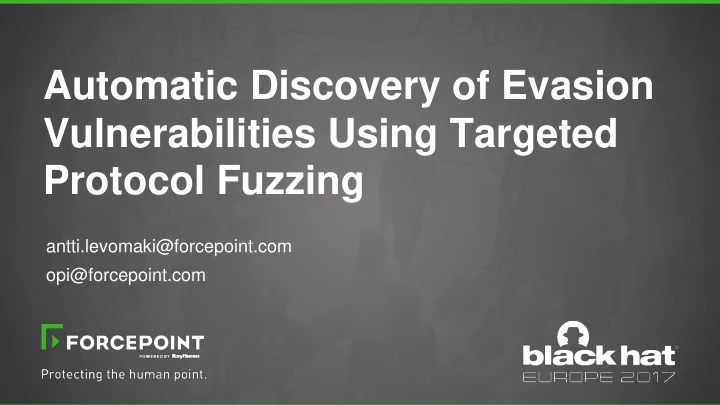

Automatic Discovery of Evasion Vulnerabilities Using Targeted Protocol Fuzzing antti.levomaki@forcepoint.com opi@forcepoint.com
WHO? ANTTI LEVOMÄKI OLLI-PEKKA NIEMI Research Scientist Director of Research
WHAT? NETWORK EVASIONS + FUZZING = Automated method for finding evasion vulnerabilities in modern up-to-date IPS & NGFW System
WHY? Evasions discovered by Ptacek and Newsham still work against modern IPS and NGFW system Lack of modern tools to highlight the risks of evasion vulnerabilities Configuring IPS systems to detect and prevent evasions can be really hard Increase the awareness to persuade vendors to fix evasion gaps
NETWORK EVASIONS Result of a different interpretation of traffic by a security device than by the victim endpoint Robustness principle: “ Be conservative in what you do, be liberal in what you accept from others ”, Jon Postel Ptacek & Newsham paper: “Insertion, Evasion, and Denial of Service: Eluding Network Intrusion Detection”, 1998
INTRODUCTION TO EVADER Applies evasion to attacks to bypass virtual patching and intrusion prevention. 2009 2010 2012 2013 2017 Research AET Threat Evader released BlackHat Relaunch. AET published Identified as freeware Talk Threat still present
EVADER Implements a few well known and old exploits to test traffic inspection Userspace TCP/IP stack with atomic evasions on all network layers Atomic evasions produce mostly valid transformations to traffic Combinations produce interesting traffic => at least 2 45 - 2 186 possible combinations depending on protocols => far too many to handle as a special case in IPS/NGFW
TEST METHODOLOGY Target CVE-2008-4250, MSRPC Server Service Vulnerability Security Device CVE-2004-1315, HTTP phpBB highlight Attacker CVE-2014-0160 Heartbleed Verify Verify Connect to Backdoor port Send Exploit Connectivity backdoor* *Heartbleed success is determined based on availability* data leaked. No backdoor / post compromise
IDEA Cannot test all dynamic combinations => generate random combinations and test them rapidly Cannot ensure that all combinations produce valid traffic => use real exploit and victim host. If the exploit works, traffic is valid. Cannot know what the IPS/NGFW is doing => configure to terminate everything it thinks is malicious.
MONGBAT Fuzz generator for Evader, runs parallel Evader instances with random evasion combinations targeting specific parts of networking protocols. Handles addressing and validates the test environment. The evasions and their parameters are selected from the set Evader lists as supported. => validation scripts to drop completely useless combinations => each run is different
MONGBAT Successful attacks are recorded for repeatability Evader command line including Evasions and parameters Random seed Packet captures
DEMO
RESULTS Success/attempts in 10 minutes of fuzz testing Vendor HTTP HTTPS Conficker Heartbleed crash a Vendor I 72 / 12364 21 / 858 0 / 557 Vendor II 133 / 8481 97 / 4119 16 / 2368 25 / 899 Vendor III 126 / 8788 277 / 4059 15 / 1204 40 / 1092 Vendor IV 746 / 1833 N/A b 2 / 1077 N/A b Vendor V 3366 / 8975 2550 / 5970 8 / 3561 50 / 891 Vendor VI 0 / 7366 0 / 6337 0 / 7778 0 / 994
RESULTS Low level evasions can be payload independent => TCP layer evasion discovered with HTTP attack likely also works with HTTPS & SMB/MSRPC Vendor HTTP HTTPS Conficker Heartbleed Vendor I H Vendor II P, C T, H P T Vendor III P, H P, C, T, H P P, C, T Vendor IV P, C, H P, C, T, H C P, C, T Vendor V P, C, T, H P, C, H T Vendor VI P = PAWS H = HTTP C = TCP_CHAFF T = TLS record layer segmentation
CHALLENGES – VENDORS ARE BLOCKING THE TOOL WHAT Block the tool FIX DE:AD:BE:EF Prevent testing by blocking MAC Changed MAC User- Agent “ Railforge ” Block attack based on User-Agent Change User-Agent TCP Syn Windows Scale 0 Prevent testing by blocking SYN OS Spoof to mimic Windows, Linux packets during 3-W HS Identify Shellbanner Block post compromise and prevent Different mechanism for success success validation validation or custom shell banner High port blocking Block post compromise and prevent Inline shell, visual effect or ack based success validation success indication Blacklist Blacklist IP or subnet used for testing Legitimate clean test pre-exploit test validation
KEY FINDINGS 1. Rapid discovery of working evasions 2. Very difficult to tune security policies to be evasion-proof 3. Low level (TCP) evasions can be payload independent 4. One (1) reliably working evasion is enough to bypass security completely.
For questions and access to EVADER contact Olli-Pekka Niemi opi@forcepoint.com antti.levomaki@forcepoint.com opi@forcepoint.com
Recommend
More recommend